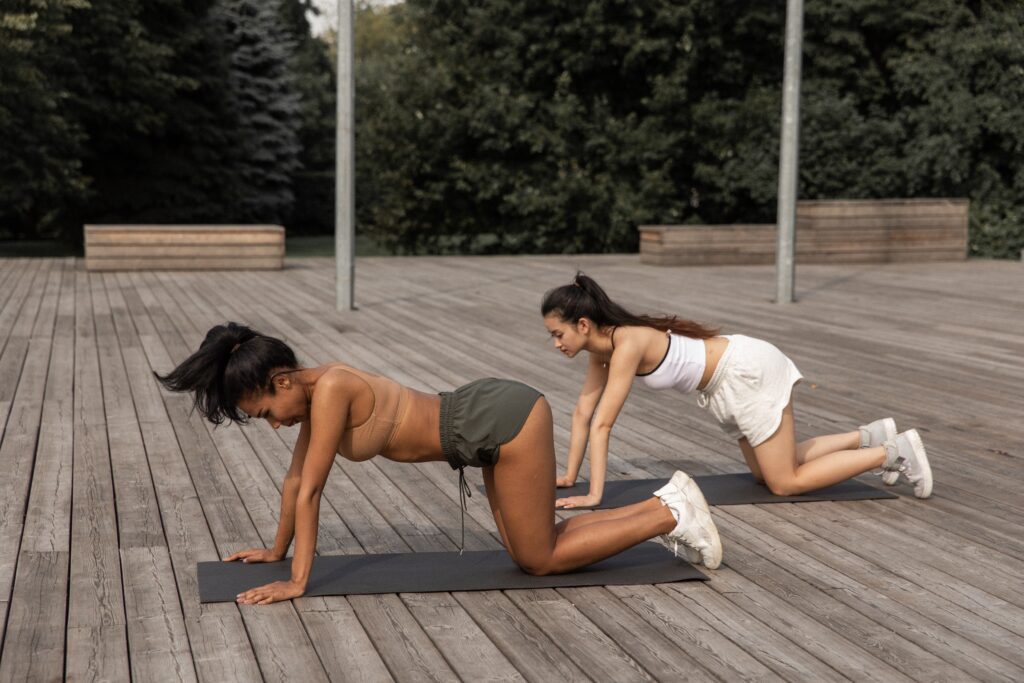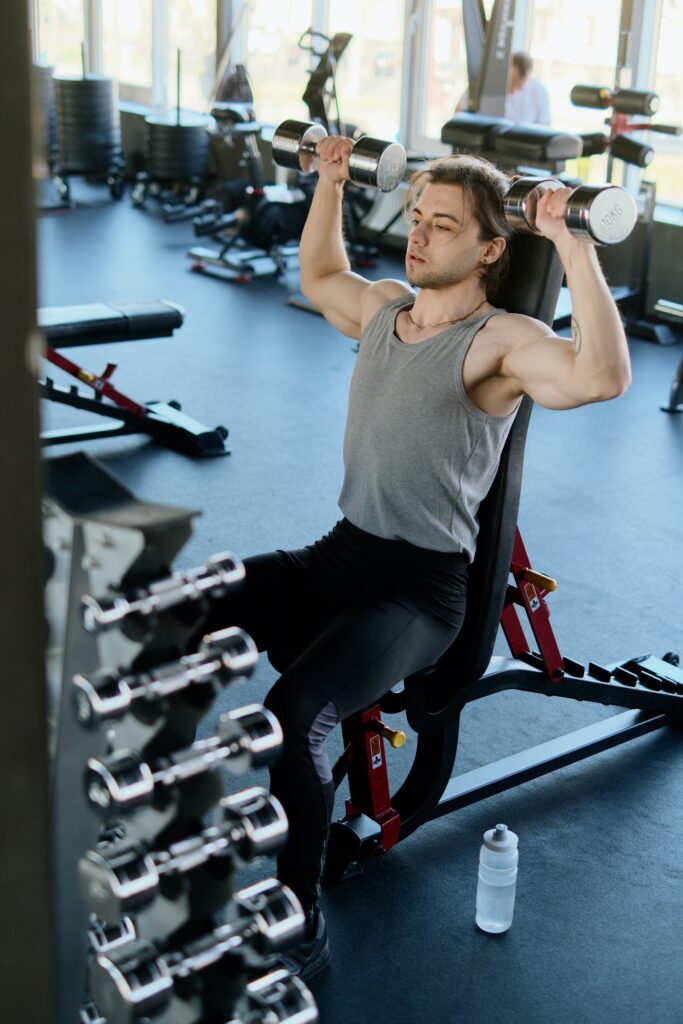Field hockey is a sport that demands a high degree of physical activity, with players in a constant state of motion and using various parts of their bodies. As with any physical activity, injuries can occur, and in this article, we will delve into the most common field hockey injuries and offer advice on how to avoid them.
Ankle sprains
Ankle sprains are among the most common injuries in field hockey, arising when the ankle is twisted or turned in an awkward position.

Preventing Ankle Sprains
To steer clear of ankle sprains, it is crucial to wear proper footwear that provides adequate ankle support, engage in proper warm-up routines before playing, and stretch your ankles.

Warm-up Activity to Reduce the Chance of Spraining Your Ankle
Calf Raises exercise help to improve ankle stability and strength by targeting the muscles in the calf. Stand on a step or a sturdy surface with your heels hanging off the edge, then slowly raise up onto your toes and lower back down. Repeat for 2-3 sets of 10-15 repetitions.
Gym Exercises to Help Strengthen Your Ankle
Calf Raises help to strengthen the muscles in the lower leg, including the ankle muscles, which can help reduce the risk of ankle sprains. Additionally, single-leg balance exercises can help improve ankle stability, which can also help reduce the risk of ankle sprains. Stand on one foot and hold for as long as possible, then switch to the other foot. Also, try it on the bosu ball!
Knee Injuries
Knee injuries are also prevalent in field hockey, and can occur due to overuse, twisting, or a direct blow to the knee.
Preventing Knee Injuries
To prevent knee injuries, players should ensure that their footwear provides proper knee support, engage in exercises that strengthen the muscles around the knee, and warm up and stretch before the game.
Warm-up Activity to Reduce the Chance of Injuring Your Knee
Walking Lunges – This exercise helps to improve lower body strength and stability, which can help reduce the risk of knee injuries. Step forward with one leg and lower your body until your thigh is parallel to the ground… now step forward with your other leg and repeat. Do 2-3 sets of 10-15 repetitions on each leg.
Gym Exercises to Help Strengthen Your Knees
Squats are a compound exercise that targets multiple muscles in the lower body, including the quadriceps, hamstrings, and glutes. They help to improve lower body strength and stability, which can help reduce the risk of knee injuries.

Lower Back Pain
The repetitive motion of running and hitting the ball in field hockey can result in lower back pain.
Preventing Lower Back Pain
To avoid this injury, players should focus on improving their core strength and posture, and engage in warm-up routines and stretching of their lower back muscles before playing.
Warm-up Activity to Reduce the Chance of Injuring Your Lower Back
Cat-Cow Stretch – This exercise helps to warm up and stretch the muscles in the lower back, which can help reduce the risk of lower back pain. Get on your hands and knees with your wrists directly under your shoulders and your knees directly under your hips. Slowly arch your back towards the ceiling while exhaling, then round your spine and bring your head towards the floor while inhaling. Repeat for 2-3 sets of 10-15 repetitions.

Gym Exercises to Help Strengthen Your Lower Back:
Deadlifts are a compound exercise that targets multiple muscles in the lower back, including the erector spinae and glutes. They help to improve lower back strength and stability, which can help reduce the risk of lower back pain.
Concussions
Concussions can occur when a player is hit in the head with a stick or ball or falls and hits their head on the ground.
Preventing Concussions
Wearing protective gear, including a helmet and mouthguard, is essential to prevent concussions. Players should also be vigilant about their surroundings and avoid collisions with other players.
Warm-up Activity to Reduce the Chance of Getting a Concussion
Neck Rotations – This exercise helps to warm up and stretch the neck muscles, which can help reduce the risk of head injuries. Slowly turn your head to one side and hold for a few seconds, then turn to the other side and repeat. Do 2-3 sets of 10-15 repetitions in each direction.
Gym Exercises to Help Strengthen Your Neck
Neck bridges help to strengthen the muscles in the neck and improve neck stability. Lie on your back with your knees bent and your feet flat on the floor. Slowly lift your hips off the ground and tuck your chin into your chest, creating a bridge with your neck and shoulders. Hold for a few seconds, then lower back down.
Shin Splints
Repetitive running and hitting the ball in field hockey can lead to tendonitis and shin splints, which can be painful and debilitating.
Preventing Shin Splints
To prevent these injuries, players should focus on improving their leg strength and flexibility, engage in proper warm-up routines, and stretch their muscles before playing.
Warm-up Activity to Reduce the Chance of Getting Shin Splints
Toe Taps – This exercise helps to warm up and strengthen the muscles in the lower leg, which can help reduce the risk of shin splints. Stand with your feet hip-width apart and tap your toes up and down rapidly for 30-60 seconds. Rest for a few seconds, then repeat for 2-3 sets.
Gym Exercises to Reduce the Risk of Shin Splints
Calf raises (again) help to strengthen the muscles in the lower leg, including the shin muscles, which can help reduce the risk of shin splints. Stand with your feet shoulder-width apart and lift up onto your toes, then slowly lower back down. Avoid harsh impacts!
BONUS: Shoulder Injuries (For the Goalkeepers!)
Shoulder injuries can result from falls or being hit in the shoulder with a stick or ball. Often landing on your shoulder when saving a ball can put stress over time and many impacts.
Preventing Shoulder Injuries
You should improve your strength and flexibility, engage in warm-up routines, and stretch your shoulders before playing. Dog
Warm-up Activity to Reduce the Chance of Injuring Your Shoulder
Arm Circles – This exercise helps to warm up and improve mobility in the shoulder joint, which can help reduce the risk of shoulder injuries. Stand with your arms out to the sides and slowly rotate your arms in a circular motion, gradually increasing the size of the circles. Do 2-3 sets of 10-15 repetitions in each direction.
Gym Exercises to Help Strengthen Your Shoulders
Overhead presses (shoulder presses) are a compound exercise that targets multiple muscles in the shoulders, including the deltoids and trapezius. They help to improve shoulder strength and stability, which can help reduce the risk of shoulder injuries.

Conclusion
While field hockey is an exhilarating sport, demanding physical exertion, it’s important to take steps to prevent injuries… otherwise, you’ll be stuck on the sideline! By following the guidelines outlined in this article, players can minimise their risk of injury and enjoy the game safely.

Leave a Reply
You must be logged in to post a comment.